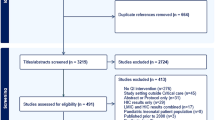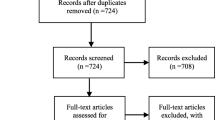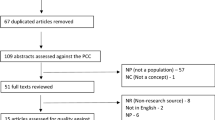Abstract
Purpose
Goals of care conversations are essential for physicians treating critically ill patients in the surgical intensive care unit (SICU). However, many providers feel uncomfortable having these conversations. This study aimed to assess the feasibility, acceptability, and effectiveness of implementing training in the Serious Illness Conversation Guide (SICG) for residents in our institution’s SICU.
Methods
All residents rotating through our institution’s SICU during the 2021–2022 academic year completed SICG training. Training consisted of a 1.5-h pre-recorded lecture, pre-course reading, and quiz followed by a 1-h group session for participants to practice the SICG with standardized patients. Validated surveys were administered before, after, and at 1, 3, 6, and 12 months post-training to evaluate the acceptability and effectiveness of the training.
Results
Training significantly increased residents’ mean confidence levels in conducting serious illness conversations (4.3 ± 0.4 vs. 5.4 ± 0.1, p < 0.001). Post-training, 92% of residents agreed or strongly agreed that the teaching methods were effective, 88% agreed or strongly agreed that the training positively impacted their attitude towards communicating with seriously ill patients, 88% agreed or strongly agreed that they could apply what they learned to their clinical practice, and 92% agreed or strongly agreed that they would recommend this training to others.
Conclusions
Training in the use of the SICG is feasible, acceptable, and effective for SICU residents at our institution. Residents reported an overall increase in confidence levels in conducting serious illness conversations and found the training applicable to their clinical practice.

Similar content being viewed by others
References
Wright AA. Associations between end-of-life discussions, patient mental health, medical care near death, and caregiver bereavement adjustment. JAMA. 2008;300(14):1665. https://doi.org/10.1001/jama.300.14.1665.
Mack JW, Weeks JC, Wright AA, Block SD, Prigerson HG. End-of-life discussions, goal attainment, and distress at the end of life: predictors and outcomes of receipt of care consistent with preferences. J Clin Oncol. 2010;28(7):1203–8. https://doi.org/10.1200/JCO.2009.25.4672.
Detering KM, Hancock AD, Reade MC, Silvester W. The impact of advance care planning on end of life care in elderly patients: randomised controlled trial. BMJ. 2010;340(mar 23 1):c1345–c1345. https://doi.org/10.1136/bmj.c1345.
Bernacki R, Paladino J, Neville BA, et al. Effect of the serious illness care program in outpatient oncology: a cluster randomized clinical trial. JAMA Intern Med. 2019;179(6):751. https://doi.org/10.1001/jamainternmed.2019.0077.
Bernacki RE, Block SD. Communication about serious illness care goals: a review and synthesis of best practices. JAMA Intern Med. 2014;174(12):1994. https://doi.org/10.1001/jamainternmed.2014.5271.
Heyland DK, Allan DE, Rocker G, et al. Discussing prognosis with patients and their families near the end of life: impact on satisfaction with end-of-life care. Open Med Peer-Rev Indep Open-Access J. 2009;3(2):e101-110.
Keating NL, Landrum MB, Rogers SO, et al. Physician factors associated with discussions about end-of-life care. Cancer. 2010;116(4):998–1006. https://doi.org/10.1002/cncr.24761.
Teno JM. Family perspectives on end-of-life care at the last place of care. JAMA. 2004;291(1):88. https://doi.org/10.1001/jama.291.1.88.
Singer AE, Meeker D, Teno JM, Lynn J, Lunney JR, Lorenz KA. Symptom trends in the last year of life from 1998 to 2010: a cohort study. Ann Intern Med. 2015;162(3):175–83. https://doi.org/10.7326/M13-1609.
Teno JM, Gozalo PL, Bynum JPW, et al. Change in end-of-life care for medicare beneficiaries: site of death, place of care, and health care transitions in 2000, 2005, and 2009. JAMA. 2013;309(5):470. https://doi.org/10.1001/jama.2012.207624.
Wright AA, Keating NL, Ayanian JZ, et al. Family perspectives on aggressive cancer care near the end of life. JAMA. 2016;315(3):284. https://doi.org/10.1001/jama.2015.18604.
Wright AA, Keating NL, Balboni TA, Matulonis UA, Block SD, Prigerson HG. Place of death: correlations with quality of life of patients with cancer and predictors of bereaved caregivers’ mental health. J Clin Oncol. 2010;28(29):4457–64. https://doi.org/10.1200/JCO.2009.26.3863.
Hanson LC, Danis M, Garrett J. What is wrong with end-of-life care? Opinions of bereaved family members. J Am Geriatr Soc. 1997;45(11):1339–44. https://doi.org/10.1111/j.1532-5415.1997.tb02933.x.
Steinhauser KE. Factors considered important at the end of life by patients, family, physicians, and other care providers. JAMA. 2000;284(19):2476. https://doi.org/10.1001/jama.284.19.2476.
Mack JW, Cronin A, Taback N, et al. End-of-life care discussions among patients with advanced cancer: a cohort study. Ann Intern Med. 2012;156(3):204. https://doi.org/10.7326/0003-4819-156-3-201202070-00008.
Curtisa JR, Patrick DL, Caldwell E, Greenlee H, Collier AC. The quality of patient-doctor communication about end-of-life care: a study of patients with advanced AIDS and their primary care clinicians. AIDS. 1999;13(9):1123–31. https://doi.org/10.1097/00002030-199906180-00017.
Schroder C, Heyland D, Jiang X, Rocker G, Dodek P. Educating medical residents in end-of-life care: insights from a multicenter survey. J Palliat Med. 2009;12(5):459–70. https://doi.org/10.1089/jpm.2008.0280.
Block SD. Medical education in end-of-life care: the status of reform. J Palliat Med. 2002;5(2):243–8. https://doi.org/10.1089/109662102753641214.
You JJ, Downar J, Fowler RA, et al. Barriers to goals of care discussions with seriously ill hospitalized patients and their families: a multicenter survey of clinicians. JAMA Intern Med. 2015;175(4):549. https://doi.org/10.1001/jamainternmed.2014.7732.
Curtis JR. Why don’t patients and physicians talk about end-of-life care?: Barriers to communication for patients with acquired immunodeficiency syndrome and their primary care clinicians. Arch Intern Med. 2000;160(11):1690–6. https://doi.org/10.1001/archinte.160.11.1690.
Chandar M, Brockstein B, Zunamon A, et al. Perspectives of health-care providers toward advance care planning in patients with advanced cancer and congestive heart failure. Am J Hosp Palliat Med. 2017;34(5):423–9. https://doi.org/10.1177/1049909116636614.
Lin JA, Im CJ, O’Sullivan P, Kirkwood KS, Cook AC. The surgical resident experience in serious illness communication: a qualitative needs assessment with proposed solutions. Am J Surg. 2021;222(6):1126–30. https://doi.org/10.1016/j.amjsurg.2021.09.013.
Lakin JR, Koritsanszky LA, Cunningham R, et al. A systematic intervention to improve serious illness communication in primary care. Health Aff (Millwood). 2017;36(7):1258–64. https://doi.org/10.1377/hlthaff.2017.0219.
Paladino J, Bernacki R, Neville BA, et al. Evaluating an intervention to improve communication between oncology clinicians and patients with life-limiting cancer: a cluster randomized clinical trial of the serious illness care program. JAMA Oncol. 2019;5(6):801. https://doi.org/10.1001/jamaoncol.2019.0292.
Paladino J, Koritsanszky L, Nisotel L, et al. Patient and clinician experience of a serious illness conversation guide in oncology: a descriptive analysis. Cancer Med. 2020;9(13):4550–60. https://doi.org/10.1002/cam4.3102.
Bernacki R, Paladino J, Lamas D, et al. Delivering more, earlier, and better goals-of-care conversations to seriously ill oncology patients. J Clin Oncol. 2015;33(29_suppl):39–39. https://doi.org/10.1200/jco.2015.33.29_suppl.39.
Paladino J, Bernacki R, Hutchings M, et al. Effect of conversations about values and goals on anxiety in patients. J Clin Oncol. 2015;33(29_suppl):9–9. https://doi.org/10.1200/jco.2015.33.29_suppl.9.
Bernacki R, Hutchings M, Vick J, et al. Development of the Serious Illness Care Program: a randomised controlled trial of a palliative care communication intervention. BMJ Open. 2015;5(10): e009032. https://doi.org/10.1136/bmjopen-2015-009032.
Harris PA, Taylor R, Minor BL, et al. The REDCap consortium: building an international community of software platform partners. J Biomed Inform. 2019;95: 103208. https://doi.org/10.1016/j.jbi.2019.103208.
Harris PA, Taylor R, Thielke R, Payne J, Gonzalez N, Conde JG. Research electronic data capture (REDCap)—a metadata-driven methodology and workflow process for providing translational research informatics support. J Biomed Inform. 2009;42(2):377–81. https://doi.org/10.1016/j.jbi.2008.08.010.
Bernard C, Tan A, Slaven M, Elston D, Heyland DK, Howard M. Exploring patient-reported barriers to advance care planning in family practice. BMC Fam Pract. 2020;21(1):94. https://doi.org/10.1186/s12875-020-01167-0.
Funding
This research was supported by Boston Medical Center.
Author information
Authors and Affiliations
Corresponding author
Ethics declarations
Conflict of interest
The authors declare that they have no conflicts of interest.
Supplementary Information
Below is the link to the electronic supplementary material.
Rights and permissions
Springer Nature or its licensor (e.g. a society or other partner) holds exclusive rights to this article under a publishing agreement with the author(s) or other rightsholder(s); author self-archiving of the accepted manuscript version of this article is solely governed by the terms of such publishing agreement and applicable law.
About this article
Cite this article
Nodoushani, A.Y., O’Brien, M.A., Dobie, A. et al. Feasibility, acceptability, and effectiveness of serious illness conversation guide training for residents in the surgical intensive care unit. Global Surg Educ 3, 24 (2024). https://doi.org/10.1007/s44186-023-00225-2
Received:
Revised:
Accepted:
Published:
DOI: https://doi.org/10.1007/s44186-023-00225-2




